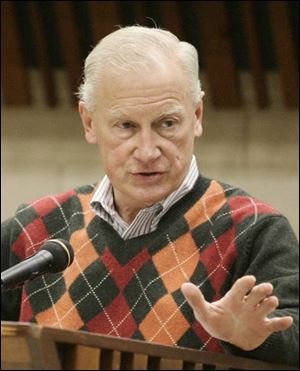
Mayor admits error in attempt to boost Sanders' paycheck
5/10/2006
Finkbeiner
In a two-page letter to the Ohio Ethics Commission, Toledo Mayor Carty Finkbeiner yesterday indirectly acknowledged that his efforts to boost the compensation of Toledo Public Schools Superintendent Eugene Sanders "could be misconstrued" as illegal.
The mayor confirmed he led a group of "community leaders" who were trying to put together a compensation package that would offset the extra $80,000 a year he said was being offered by Cleveland Public Schools to hire Mr. Sanders. Sounding a note of contrition, Mr. Finkbeiner said in the letter he was unaware at the time of an Ohio law that makes it illegal to supplement the salary of a public official.
"Now that I am aware of the statute, I recognize that it would be better for me to refrain from any activity that could be misconstrued as a violation of the statute and I will conduct myself accordingly," he wrote.
Mr. Finkbeiner said that a group explored the possibility of assembling a package that included a car, a summer teaching job, and a retirement annuity in an effort to keep Mr. Sanders in Toledo.
He said in the letter that the efforts were preliminary and would have been cleared for legality before any commitments were made.
Paul Nick, chief investigative attorney for the state Ethics Commission, said the mayor's request for review will be referred to the commission at its next meeting on May 23.
The commission can rule that there was insufficient evidence to say the law was broken; it can order an alternative resolution; or it can refer the case to the county prosecutor, he said.
Lucas County Prosecutor Julia Bates previously declined to investigate the matter, in part because of the workload her office already faces with such major cases at the murder trial of the Rev. Gerald Robinson and the indictment of former Toledo-area coin dealer and GOP fund-raiser Tom Noe. However, Mrs. Bates did refer the matter as a possible misdemeanor violation to acting city Law Director John Madigan on April 20.
City Council President Rob Ludeman said yesterday that the mayor did the right thing by calling in the Ethics Commission.
"John Madigan serves at the pleasure of the mayor and I don't think that [he] is the right authority to look at the issue to see if there was any impropriety of any kind," Mr. Ludeman said.
At issue is Ohio Revised Code 2921.43, which prohibits a public servant from soliciting, and a citizen from promising or giving, anything of value to "supplement ... the public servant's public compensation." Violation of the law is a misdemeanor of the first degree, and would bar anyone convicted of it from holding office for seven years.
Mr. Ludeman is in line to become mayor if Mr. Finkbeiner steps down.
Writing on his personal stationery and using his home address, the mayor said some have questioned whether he violated ORC 2921.43.
Mr. Finkbeiner said while Mr. Sanders was informed of their efforts, the only firm proposal made was an offer from the University of Toledo for Mr. Sanders to teach during the summer.
He said the effort was dropped when Mr. Sanders told him he would not change his mind about taking the Cleveland job.
"Please know that I have come to understand why a public official should receive compensation for performing his duties only from his public employer and the important interests the statute is intended to protect," the mayor wrote.
Mr. Finkbeiner was convicted of an ethical lapse in 1998 for failing to disclose a $10,000 payment for the sale of his condominium in the 1994 Owens-Corning relocation.
A case that occurred in 2001 in Franklin County had similar issues to the Sanders' situation.
That case initially went to the Ethics Commission and was referred to the county prosecutor. The Greater Columbus Chamber of Commerce and the then-superintendent raised about $34,000 to help Don Haydon, a newly recruited school chief operating official from another state, buy a house.
Franklin County Prosecutor Ron O'Brien concluded that the payment violated Ohio ethics law. He had Mr. Haydon return the money, but said he declined to prosecute because Mr. Haydon had inquired whether the payment was legal and was given erroneous advice.
Mr. O'Brien said that, based on what he knew of Toledo's situation, he did not believe the law had been broken because no actual cash was collected.
-TOM TROY